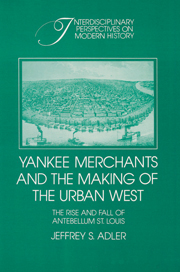Book contents
4 - Yankee newcomers and prosperity
Published online by Cambridge University Press: 14 September 2009
Summary
Eastern attention did not, by itself, stimulate the development of western cities. Travel writers, religious spokesmen, and newspaper editors could present alluring portraits of bustling cities at the edge of civilization, but unless capitalists and potential migrants responded to these images, they had little effect. The dissemination of information about the urban West was only a catalyst for growth if it triggered investment and migration. Many easterners, for example, had read about Alton, Illinois. Newspapers and western travelers often described the Mississippi river town where Elijah Lovejoy, the abolitionist editor, had been murdered. This information, however, directed few settlers to Alton, and thus it failed to influence the growth of the Illinois town. Descriptions of St. Louis, by comparison, not only captured the attention of Yankee readers but also produced an eastern response that transformed the development of the Missouri city and the urban West.
Accounts of life in St. Louis attracted investors and migrants, accelerating the pace of economic growth. During the mid-1840s many eastern entrepreneurs became convinced that the undeveloped river town would become the “New York of the West,” and they directed their surplus capital to the city and lifted the local economy from the doldrums of the depression years.
- Type
- Chapter
- Information
- Yankee Merchants and the Making of the Urban WestThe Rise and Fall of Antebellum St Louis, pp. 61 - 90Publisher: Cambridge University PressPrint publication year: 1991



